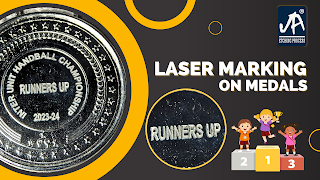Laser Marking: Precision and Permanence in Modern Manufacturing
In the ever-evolving landscape of modern manufacturing, precision and permanence are two key requirements for success. Manufacturers are constantly searching for innovative methods to mark and identify their products. One technology that has become indispensable in this quest is laser marking. In this article, we'll delve into the world of laser marking, its applications, and how it's transforming manufacturing processes.
Laser Marking: What Is It?
Laser marking is a process that utilizes laser technology to engrave or mark a wide range of materials, including metals and plastics. It's a highly versatile and precise method that offers several advantages for modern manufacturing.
The Power of Precision
Precision is the name of the game in manufacturing, and laser marking delivers it in spades. Laser marking technology allows for incredibly fine details, even on small or intricate components. The precision of laser marking ensures that markings are legible, even when reduced to a fraction of a millimeter. This level of accuracy is vital for industries where tracking and traceability are critical, such as automotive, aerospace, and medical device manufacturing.
Diverse Applications in Modern Manufacturing
Laser marking has a wide range of applications in modern manufacturing:
1. Automotive Industry: In automotive manufacturing, laser marking is used to mark various parts and components, from engine components to safety-critical items. These markings can include serial numbers, part numbers, and QR codes for tracking and quality control.
2. Aerospace Industry: The aerospace sector relies heavily on laser marking to identify critical components. Whether it's marking individual parts or adding barcodes for inventory management, precision and permanence are essential in this industry.
3. Medical Devices: Medical device manufacturers use laser marking to add unique device identifiers (UDI) to their products. This is crucial for traceability and compliance with regulatory requirements.
4. Electronics: Electronics manufacturers use laser marking to add branding, serial numbers, and other information to their products. The permanence and precision of laser marking ensure product authenticity and tracking.
The Permanence of Laser Marking
In modern manufacturing, permanence is crucial. Manufacturers need markings and engravings that can withstand the test of time and the harsh conditions to which their products might be exposed. Laser marking excels in this regard:
1. Durability: Laser markings are highly durable and resistant to wear and environmental factors. They don't fade or wear off easily, making them ideal for components that will be subjected to challenging conditions.
2. Non-Contact Process: Laser marking is a non-contact process, which means there is no physical stress on the material being marked. This makes it suitable for delicate components that can't withstand the pressure or heat associated with other marking methods.
3. Resistance to Chemicals: Laser markings are resistant to chemicals, ensuring that they remain intact even in the presence of corrosive substances.
Laser Printing on Metals
Laser marking is particularly effective on metals. The precision and permanence it offers are invaluable in industries where metal parts are essential. Whether it's a barcode on an aerospace component, a serial number on an automotive part, or a manufacturer's logo on an electronic device, laser printing on metals is the go-to solution.
Laser Marking Services
Many manufacturers choose to outsource their laser marking needs to specialized service providers. Laser marking services offer the expertise, equipment, and experience needed to achieve the best results. These providers often have the capability to work with a variety of materials, including metals and plastics, and can handle diverse marking requirements.
Plastic Mould Texture Services
For manufacturers working with plastics, another essential service is plastic mould texture services. These services involve creating surface textures or patterns on plastic molds, which are then transferred to the final plastic products. The texture services are highly precise and can be customized to meet specific design requirements. Whether it's adding a unique texture to enhance grip on a handheld device or creating a specific look for a consumer product, plastic mould texture services are a valuable tool in modern manufacturing.
In conclusion, laser marking plays a pivotal role in modern manufacturing, offering the precision and permanence required in a wide range of industries. From aerospace to electronics, the accuracy, durability, and versatility of laser marking are indispensable. By embracing laser marking and related services, manufacturers can ensure that their products are not only high-quality but also easily traceable and identifiable. It's a technology that's here to stay, driving efficiency and quality in the manufacturing sector.

Comments
Post a Comment